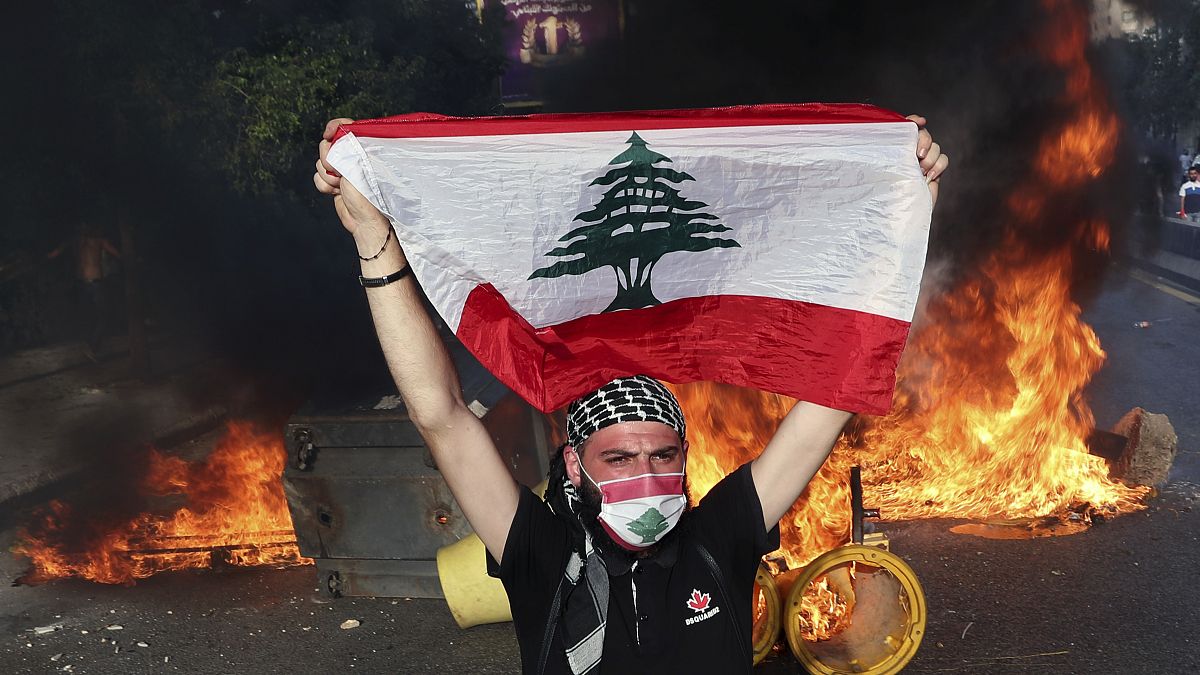Opposing groups and police clashed as demonstrators tried to revive Lebanon's nationwide protests that began late last year amid an unprecedented economic and financial crisis.
Lebanese riot police fired tear gas at protesters in central Beirut on Saturday, after a planned anti-government demonstration quickly degenerated into rioting and stone-throwing confrontations between opposing camps.
A few thousand demonstrators had gathered in Martyrs' Square hoping to reboot nationwide protests that began late last year amid an unprecedented economic and financial crisis. But tensions and divisions over the goals of the demonstration quickly became apparent as groups of young men faced off, with the army standing between them.
Scattered groups of protesters arrived in the capital's downtown area, many of them without masks to protect against the spread of the coronavirus, in response to calls for a centralized protest to press for demands.
Lebanese rose up against their political leaders in nationwide mass protests on Oct. 17 amid a spiraling economic crisis, blaming them for decades of corruption and mismanagement. The protests, which further deepened the slump, eventually lost some momentum and later were put on hold after the outbreak of the pandemic.
It was the biggest protest since the government gradually began easing a lockdown aimed at curbing the virus last month. Saturday's protest was called for by grassroots organizations and civil society groups as well as several political parties, including some groups who have introduced for the first time demands for the Shiite militant group Hezbollah to disarm.
The participation of political groups and anti-Hezbollah slogans upset some activists and protesters who say the focus should remain on addressing the country's economic crisis and calling for early elections.
”We are demanding an independent judiciary system, accountability and early parliament elections," said Firas Abou Hatoum, an activist. “These demands are the demands of the 17th of October revolution and we are still demanding it, apart from the calls to disarm Hezbollah’s weapon.”
Some of the banners held by protesters read “Lebanese Lives Matter,” a play on words from the “Black Lives Matter" slogan that has been used in some U.S. protests.
Hundreds of Lebanese soldiers and riot police were deployed on major roads in the capital and its suburbs ahead of the protest. They later stood between supporters of Hezbollah and its allied Shiite Amal movement on one side and protesters on the other, some of whom shouted insults aimed at the Hezbollah leader, Sayyed Hassan Nasrallah.
The pro-Hezbollah side, some carrying yellow Hezbollah flags, chanted “Shia, Shia, Shia!”
Near the parliament building, a group of young men hurled rocks over cement barriers erected to seal off the area. Young men vandalized several storefronts, including a luxury French designer furniture company, and a nearby hotel. They pulled out a designer couch after smashing the storefront window and breaking into the shop, and used it to block a road. Police responded with heavy tear gas.
The unprecedented economic crisis, nationwide protests and pandemic pose the biggest threat to stability since the end of the country’s civil war in 1990, and there are fears of a new slide into violence.
In recent weeks, the Lebanese pound, pegged to the dollar for more than two decades, has lost 60% of its value against the dollar and prices of basic goods soared. Unemployment has risen to 35% and an estimated 45% of the country’s population is now below the poverty line.
The government of Prime Minister Hassan Diab is negotiating a financial package with the International Monetary Fund that it hopes will secure billions of dollars to shore up the sinking economy.
